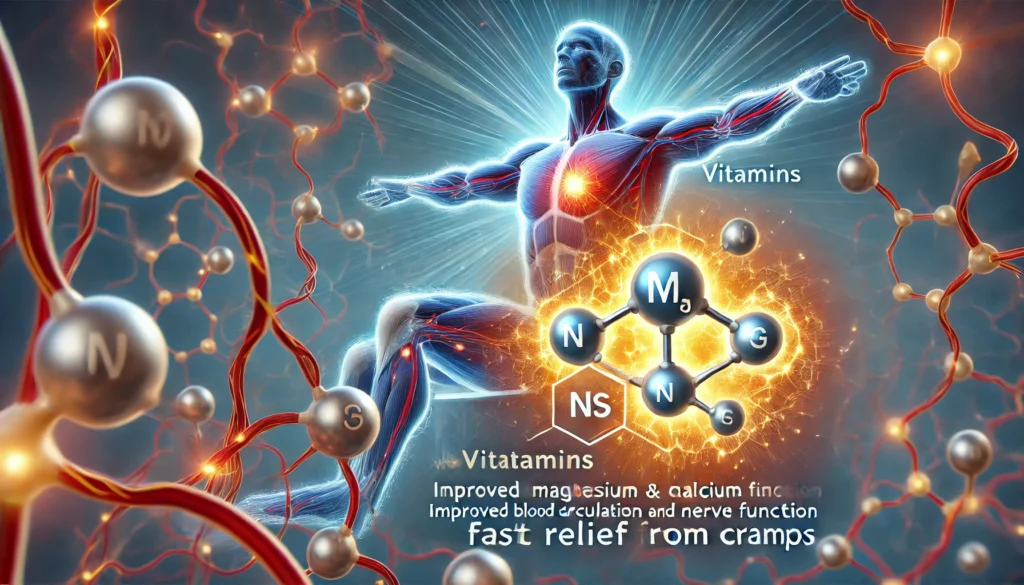Muscle cramps are sudden, involuntary contractions or spasms in one or more muscles, typically lasting from a few seconds to several minutes. Although commonly associated with the legs, cramps can occur in any muscle group. Their causes are multifaceted, including dehydration, electrolyte imbalances, prolonged physical activity, and inadequate nutrient intake.
You may also like: Essential Oils for Emotional Well-Being
Common Causes of Muscle Cramps
Dehydration is a frequent culprit, as the lack of fluids can disrupt the balance of electrolytes, such as sodium, potassium, and calcium, which are critical for muscle function. Without sufficient hydration, muscles can become prone to cramping. In addition, overexertion during physical activity can lead to muscle fatigue, increasing the risk of cramps, especially if the body is not adequately conditioned or warmed up.
The Role of Electrolytes
Electrolytes are minerals that carry an electric charge and are vital for muscle contractions. An imbalance can disrupt the communication between nerves and muscles, leading to spasms. Sodium, potassium, and calcium are among the key electrolytes involved in muscle function. Ensuring their balance through diet and hydration can prevent cramps.
Nutritional Deficiencies and Muscle Health
Inadequate intake of essential nutrients, particularly vitamins, can impair muscle function. Vitamins are crucial for various biochemical processes in the body, including those that regulate muscle contractions and nerve signaling. A deficiency in these nutrients can lead to muscle weakness and increased susceptibility to cramps.
The Role of Vitamins in Muscle Function
Vitamins are organic compounds that are essential for various bodily functions, including muscle health. They play pivotal roles in cellular metabolism, nerve function, and muscle contraction. When our bodies lack sufficient vitamins, it can lead to muscle weakness and cramps. Therefore, maintaining an adequate intake of certain vitamins is crucial for preventing and alleviating muscle cramps.
Vitamins and Cellular Metabolism
Vitamins act as coenzymes in metabolic processes, facilitating the conversion of food into energy. This energy is necessary for muscle cells to contract and relax efficiently. Without adequate vitamin levels, energy production can be compromised, leading to muscle fatigue and cramps.
Nerve Function and Vitamin Support
Nerve cells rely on vitamins to produce neurotransmitters, which are chemicals that transmit signals between nerves and muscles. Vitamins such as B6 and B12 are particularly important in this process. A deficiency can impair nerve function, leading to improper muscle responses and cramps.
Muscle Contraction and Vitamin Influence
Certain vitamins are directly involved in muscle contraction mechanisms. For instance, vitamin D aids in calcium absorption, a mineral essential for muscle contraction. Without adequate vitamin D, calcium levels can drop, resulting in muscle cramps and weakness.

Key Vitamins for Cramp Relief
Vitamin B1 (Thiamine)
Vitamin B1, or thiamine, is vital for energy metabolism and nerve function. It facilitates the conversion of carbohydrates into energy, which is crucial for muscle contraction and relaxation. Thiamine deficiency can lead to muscle weakness and cramps, particularly in the legs.
The Importance of Energy Metabolism
Thiamine is a key player in the Krebs cycle, a series of chemical reactions used by all aerobic organisms to generate energy. This energy is necessary for sustaining muscle contractions. A lack of thiamine can hinder this process, leading to fatigue and cramps.
Nervous System Support
Thiamine supports the nervous system by maintaining the health of nerve membranes. Healthy nerves ensure that signals between the brain and muscles are transmitted efficiently, preventing involuntary contractions.
Symptoms of Thiamine Deficiency
Thiamine deficiency can present as muscle weakness, fatigue, and cramps. Severe deficiency, known as beriberi, can lead to more pronounced symptoms, including neurological and cardiovascular issues.
Sources of Vitamin B1
Rich dietary sources of thiamine include whole grains, legumes, nuts, seeds, pork, and fortified cereals. Including these foods in your diet can help prevent deficiencies and alleviate cramps.
Whole Grains and Legumes
Whole grains, such as brown rice and oats, are excellent sources of thiamine. Legumes, including lentils and beans, also provide significant amounts. Incorporating these into your meals can boost thiamine levels.
Nuts and Seeds
Nuts, such as sunflower seeds and macadamia nuts, are not only rich in thiamine but also provide healthy fats and proteins. These can be easily added to snacks or meals to enhance nutrient intake.
Animal Sources and Fortified Foods
Pork is one of the richest sources of thiamine among meats. Additionally, many cereals are fortified with thiamine, making them an easy way to ensure adequate intake, especially for those with dietary restrictions.
Vitamin B6 (Pyridoxine)
Vitamin B6 plays a critical role in amino acid metabolism and neurotransmitter synthesis. It is involved in the production of serotonin, a neurotransmitter that regulates muscle contractions. A deficiency in vitamin B6 can impair muscle function and lead to cramps.
Amino Acid Metabolism
Vitamin B6 is essential for the metabolism of amino acids, the building blocks of proteins. Proper amino acid metabolism supports muscle repair and growth, reducing the likelihood of cramps.
Neurotransmitter Synthesis
B6 is crucial for synthesizing neurotransmitters, including serotonin, which helps regulate muscle contractions. A deficiency can disrupt this process, leading to uncontrolled muscle spasms.
Signs of Vitamin B6 Deficiency
Lack of vitamin B6 can lead to symptoms such as irritability, depression, and muscle cramps. Recognizing these signs early can help in addressing the deficiency before it worsens.
Sources of Vitamin B6
Foods rich in vitamin B6 include poultry, fish, potatoes, bananas, chickpeas, and fortified cereals. Ensuring adequate intake of these foods can support muscle health and reduce cramping.
Poultry and Fish
Chicken, turkey, and fish such as salmon and tuna are excellent sources of vitamin B6. These can be included in a balanced diet to support overall health and muscle function.
Plant-Based Sources
Potatoes, bananas, and chickpeas are rich in vitamin B6 and offer alternatives for those who prefer plant-based diets. These foods are versatile and can be incorporated into various dishes.
Fortified Options
Fortified cereals provide an additional source of vitamin B6, making it easier to meet daily requirements. They are particularly useful for those with dietary restrictions or preferences.
Vitamin B12 (Cobalamin)
Vitamin B12 is essential for the formation of red blood cells and the maintenance of nerve cells. It is crucial for the proper functioning of the nervous system and muscle coordination. Deficiency in vitamin B12 can result in neurological issues and muscle cramps.
Red Blood Cell Formation
Vitamin B12 is necessary for the production of healthy red blood cells, which carry oxygen to muscles. Without sufficient B12, oxygen delivery can be impaired, leading to muscle fatigue and cramps.
Nerve Cell Maintenance
B12 supports the myelin sheath, a protective covering around nerves. A healthy myelin sheath ensures efficient signal transmission between nerves and muscles, preventing cramps.
Neurological Impacts of Deficiency
B12 deficiency can cause neurological symptoms, including tingling, numbness, and muscle cramps. Early detection and supplementation can prevent these issues from escalating.
Sources of Vitamin B12
Vitamin B12 is predominantly found in animal products, including meat, fish, eggs, and dairy. Vegetarians and vegans may consider fortified foods or supplements to meet their vitamin B12 needs.
Animal Products
Meat, fish, and dairy are rich sources of vitamin B12. Regular consumption of these foods can help maintain adequate B12 levels.
Fortified Foods for Vegetarians
For those following a vegetarian or vegan diet, fortified foods such as plant-based milks and cereals can provide necessary B12. Supplements are also an option to ensure sufficient intake.
Choosing the Right Supplements
When opting for supplements, it is important to choose high-quality products. Consulting with a healthcare provider can help determine the appropriate dosage and type of supplement.
Vitamin D
Vitamin D is renowned for its role in bone health, but it also plays a significant part in muscle function. It facilitates calcium absorption, which is essential for muscle contraction. Inadequate levels of vitamin D can lead to muscle weakness and cramps.
Calcium Absorption and Muscle Contraction
Vitamin D enhances the absorption of calcium from the diet, a mineral critical for muscle contraction. Without enough vitamin D, calcium levels can drop, impairing muscle function.
Impact on Muscle Strength
Adequate vitamin D levels are associated with improved muscle strength and function. A deficiency can lead to muscle weakness and an increased risk of cramps.
Recognizing Vitamin D Deficiency
Symptoms of vitamin D deficiency include muscle pain, weakness, and cramps. Addressing these symptoms early with lifestyle changes or supplementation can improve muscle health.
Sources of Vitamin D
Sunlight exposure is the most natural source of vitamin D. Dietary sources include fatty fish, egg yolks, and fortified foods such as milk and cereals. Supplements may be necessary for those with limited sun exposure or dietary intake.
Sunlight as a Natural Source
The body synthesizes vitamin D when the skin is exposed to sunlight. Spending time outdoors can boost vitamin D levels, particularly during sunnier months.
Dietary Sources
Fatty fish, such as salmon and mackerel, and egg yolks provide dietary vitamin D. Fortified foods, including certain milks and cereals, offer additional sources.
Supplementation Considerations
For individuals with limited sun exposure or dietary intake, vitamin D supplements can help maintain adequate levels. It’s important to choose the right dosage based on individual needs and consult with a healthcare provider.
Vitamin E
Vitamin E acts as an antioxidant, protecting cells from oxidative stress. It supports healthy blood circulation and reduces inflammation, which can contribute to muscle cramps. Vitamin E deficiency, although rare, can impair muscle function.
Antioxidant Protection
Vitamin E neutralizes free radicals, preventing cellular damage. This protection is crucial for maintaining muscle cell integrity and function.
Circulation and Inflammation
Vitamin E supports blood circulation, ensuring muscles receive adequate oxygen and nutrients. It also reduces inflammation, which can exacerbate muscle cramps.
Identifying Vitamin E Deficiency
Although rare, a deficiency in vitamin E can cause muscle weakness and cramps. Recognizing these symptoms can prompt dietary changes or supplementation.
Sources of Vitamin E
Nuts, seeds, spinach, and broccoli are excellent sources of vitamin E. Incorporating these foods into your diet can support muscle health and prevent cramping.
Nuts and Seeds
Almonds, sunflower seeds, and hazelnuts are rich in vitamin E. These can be included in snacks or meals to enhance vitamin intake.
Leafy Greens and Vegetables
Spinach and broccoli are not only high in vitamin E but also offer other essential nutrients. Adding these vegetables to your diet can support overall health.
Incorporating Vitamin E-Rich Foods
Including a variety of vitamin E-rich foods in your meals ensures a balanced intake. These foods can be easily added to salads, smoothies, or as side dishes.

Practical Advice for Preventing Muscle Cramps
While vitamins are integral to preventing and relieving muscle cramps, other strategies can enhance their effectiveness:
Hydration: A Key Component
Ensure adequate fluid intake to maintain electrolyte balance. Hydration is crucial for preventing cramps, as it supports nutrient transport and muscle function. Drinking water consistently throughout the day helps keep muscles hydrated and reduces the risk of cramping.
Balanced Diet: Nutrient-Rich Foods
Consume a variety of nutrient-rich foods to support overall health. A well-balanced diet provides essential vitamins and minerals necessary for muscle function. Including a range of fruits, vegetables, whole grains, and proteins ensures comprehensive nutritional support.
Regular Exercise: Strength and Circulation
Engage in regular physical activity to strengthen muscles and improve circulation. Exercise promotes muscle flexibility and endurance, reducing the likelihood of cramps. Incorporating both aerobic and strength-training exercises can optimize muscle health.
Stretching: Enhancing Flexibility
Incorporate stretching exercises to enhance flexibility and reduce cramping. Stretching helps maintain muscle elasticity and reduces tension. Regular stretching routines, especially before and after exercise, can prevent cramps and improve overall muscle performance.
Future Implications and Trends
The understanding of vitamins and their role in muscle health is continually evolving. Emerging research is exploring the potential of personalized nutrition and supplementation based on genetic predispositions and lifestyle factors. Additionally, advancements in biohacking and nootropic supplements are providing new insights into optimizing muscle function and preventing cramps.
Personalized Nutrition: Tailored Approaches
Personalized nutrition involves customizing dietary recommendations based on individual genetic makeup and lifestyle. This approach can optimize vitamin intake and muscle health, offering more effective prevention of cramps. As research progresses, personalized nutrition may become a standard in dietary planning.
Biohacking and Nootropic Advances
Biohacking and nootropics are gaining attention for their potential to enhance physical and cognitive performance. These innovations may offer new methods for improving muscle function and preventing cramps. Understanding these advancements can provide additional tools for muscle health optimization.
Future Research and Developments
Ongoing research is likely to uncover new relationships between vitamins and muscle function. Emerging studies may reveal additional vitamins or compounds beneficial for cramp prevention. Staying informed about these developments can empower individuals to make better health choices.

Conclusion
Vitamins play an indispensable role in supporting muscle health and preventing cramps. By ensuring adequate intake of essential vitamins such as B1, B6, B12, D, and E, individuals can alleviate cramps and enhance overall muscle function. Coupled with hydration, a balanced diet, and regular exercise, these vitamins offer a comprehensive approach to cramp relief. As research in this field progresses, staying informed about the latest trends and recommendations will empower you to make informed decisions about your health and wellness.
Embracing a Holistic Approach
A holistic approach to muscle health involves a combination of nutrition, exercise, and lifestyle practices. This comprehensive strategy can effectively prevent and alleviate cramps, promoting overall well-being. By integrating these elements, individuals can achieve optimal muscle function and health.
Staying Informed and Proactive
Keeping abreast of the latest research and recommendations empowers individuals to make informed health decisions. Proactive management of muscle health through vitamins and lifestyle changes can prevent cramps and enhance quality of life. Continuous learning and adaptation are key to maintaining muscle health.
The Path Forward
As our understanding of vitamins and muscle health evolves, embracing new insights and practices will be crucial. The path forward involves integrating traditional knowledge with emerging research to optimize muscle function. With informed choices and proactive measures, individuals can enjoy improved muscle health and reduced cramping.
Further Reading:
The Best Foods That Help with Period Cramps
The Top Vitamins and Supplements For Muscle Cramps + Spasms
Important Note: The information contained in this article is for general informational purposes only, and should not be construed as health or medical advice, nor is it intended to diagnose, prevent, treat, or cure any disease or health condition. Before embarking on any diet, fitness regimen, or program of nutritional supplementation, it is advisable to consult your healthcare professional in order to determine its safety and probable efficacy in terms of your individual state of health.
Regarding Nutritional Supplements Or Other Non-Prescription Health Products: If any nutritional supplements or other non-prescription health products are mentioned in the foregoing article, any claims or statements made about them have not been evaluated by the U.S. Food and Drug Administration, and such nutritional supplements or other health products are not intended to diagnose, treat, cure, or prevent any disease.


